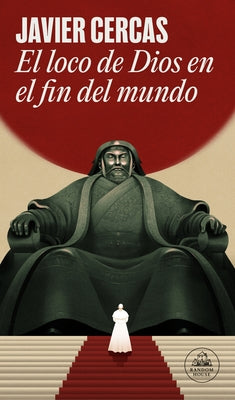Description
Garth Risk Hallberg, The New York Times "I'm an atheist. I'm anticlerical. I am militantly secular, a stubborn rationalist, a committed unbeliever. But here I am, flying to Mongolia with the Vicar of Christ on earth, preparing to question him about the resurrection of the flesh and eternal life. This why I'm on board this plane: to ask Pope Francis if my mother will see my father in the afterlife and report his answer back to her. That's how a godless lunatic like me ended up following God's shepherd to the ends of the earth." This is the unexpected origin of a one-of-a-kind book, not least because the Vatican has never given a writer this kind of access before. In El loco de Dios en el fin del mundo, Javier Cercas manages to turn an unusual premise into a masterful and very personal project: a thriller about the greatest mystery in human history. In this non-fiction novel, Cercas interweaves his personal obsessions with some of the fundamental issues facing contemporary society: the role of spirituality and mysticism, religion, and the quest for immortality in human life.
Author: Javier Cercas
Publisher: Prh Grupo Editorial
Published: 08/19/2025
Pages: 448
Binding Type: Paperback
Weight: 1.14lbs
Size: 9.00h x 5.29w x 1.22d
ISBN13: 9788439745297
ISBN10: 843974529X
Language: Spanish
BISAC Categories:
- Fiction | Literary
- Fiction | World Literature | Spain | 21st Century
About the Author
Javier Cercas (Ibahernando, Cáceres, 1962) es profesor de literatura española en la Universidad de Gerona, Honorary Fellow de la Universidad de Oxford y profesor honorario de la Universidad Diego Portales, en Chile. Traducida a más de treinta lenguas, su obra consta de las siguientes novelas: El móvil, El inquilino, El vientre de la ballena, Soldados de Salamina (The Independent Foreign Fiction Prize, Premio Grinzane-Cavour, Premio de la Crítica de Chile, Premio Ciudad de Barcelona, Premi Llibreter, Premio Salambó, entre otros), La velocidad de la luz (Athens Prize for Literatura, Premio Arzobisto Juan de San Clemente, Premio Fernando Lara, ex aequo), Anatomía de un instante (Premio Nacional de Narrativa, Premio Internacional Terenci Moix, Premio Mondello Città di Palermo, Prix Jean Moner, Premio Radovan Galonja), Las leyes de la frontera (Prix Méditérranée Étranger, Premio Correntes d'Escritas, Premio Mandarache), El impostor (Prix du Libre Europeén, Premio Internazionale Isola D'Elba, Premio Internazionale Ceppo di Pistoia, Premio Arzobispo Juan de San Clemente, Premio Taofen a la mejor novela extranjera publicada en China), El monarca de las sombras (Prix Malraux), Terra Alta (Premio Planeta y Dagger Prize), Independencia y El castillo de Barbazul (Premio Internazionale NordSud). También ha publicado libros misceláneos -Una buena temporada, Relatos reales, La verdad de Agamenón, Formas de ocultarse, No callar y La aventura de escribir- y ensayos La obra literaria de Gonzalo Suárez y El punto ciego. Ha recibido además diversos premios de ensayo y de periodismo, como el Francesco de Sanctis, en Italia, o el Joaquín Romero Murube y el Francisco Cerecedo, en España, así como diversos reconocimientos a toda su carrera, entre ellos el Premio EÑE, en España, el Prix Ulysse o el Prix Dialogo, en Francia, o el Premio Internazionale del Salone del Libro di Torino, el Premio Friuladria, el Premio Internazionale Città di Vigevano o el Premio Sicilia, todos ellos en Italia, así como el International Literary Flame Award en Montenegro.

